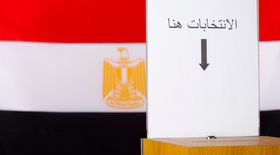 My way or the highway. Field Marshal Mohamed Hussein Tantawi, Chairman of Egypt's Military Council, is using a theme from the late singer Frank Sinatra's portfolio to let citizens know who is in charge.
My way or the highway. Field Marshal Mohamed Hussein Tantawi, Chairman of Egypt's Military Council, is using a theme from the late singer Frank Sinatra's portfolio to let citizens know who is in charge.Tantawi and his 19-member Supreme Council of the Armed Forces (SCAF) are in charge - election or no election, president or no president.
That is what Tantawi boldly told 80 million Egyptians following the turbulent two-day Presidential election June 16-17. The winner was supposed to have been formally announced June 21. The two finalists each claim victory by allegedly garnering 51 percent of the vote.
They are Mohammed Morsi, a 60-year-old member of the Muslim Brotherhood Party, and Ahmed Shafiq, the 70-year-old former Air Force commander who served one month as Egypt's prime minister before Hosni Mubarak, 84, was chased from his Presidential Palace on Feb. 11, 2011. More than 800 people died and 6,000 were wounded during the 2011 uprising.
But now the Supreme Presidential Electoral Commission says the official announcement will have to wait until its 19 members investigate a total 400 fraud complaints filed by both candidates.
The only catch here is that this commission is made up almost entirely of Mubarak-era members and other individuals who owe their status to the military. So who do you think will get the nod if the vote count is honestly close? Shafiq, of course. It isn't rocket science.
Shafiq, an admirer and longtime friend of Mubarak, is seen by opponents as an extension of the old regime.
Morsi's opponents, in turn, fear that if he wins, the Brotherhood will take over the nation and turn it into an Islamic state, curbing freedoms and consigning minority Christians and women to second-class citizens.
 Mubarak, backed by the military, had ruled Egypt for 31 years. Tantawi was Mubarak's Minister of Defense for 20 years.
Mubarak, backed by the military, had ruled Egypt for 31 years. Tantawi was Mubarak's Minister of Defense for 20 years.The two-day voting turnout was miserable. Less than half of the 50 million registered voters cast their ballots. The remainder stayed home, fed up with the double-talk and manipulative actions of the army over the last two weeks.
In the first round of the presidential election in May, Morsi reportedly took 51.8 percent of the vote to Shafiq's 48.1 percent out of 24.6 million votes cast, with 98 percent of the more than 13,000 poll centers counted.
Here is what Field Marshall Tantawi and his secretive 19-member Military Council pulled off in the past two weeks. Even Hollywood would wince at this scenario:
- Dissolved Parliament and threw out all 518 members representing 18 political parties.
- Barred the legislators from even entering the Parliament building.
- Connived with two high-court judges to tear up the country's constitution. The judges on the Supreme Constitutional Court were Mubarak-era appointees.
- Enacted martial law. Anyone speaking out against the government could be arrested. The government right now is the army.
- The generals issued an interim constitution making themselves Egypt's lawmakers,
- The military took control over the budget and granted themselves the power to determine who writes the permanent constitution that will define the country's future.
- The new president will not be able to appoint a Cabinet or approve or reject laws. He will be just a puppet whose strings will be manipulated by the military.
- The generals will also name the 100-member panel tasked with drafting a new constitution. That will guarantee the generals a say in key policies like defense and national security as well as shield their vast economic empire from civilian scrutiny.
Egyptians and the rest of the world now wait as the country's two strongest forces - the army and the Brotherhood - square off rhetorically. You know already who the winner is going to be.
As Broadway producer Mel Brooks often quips, "Him that has the gold, rules." In this care, the army not only has the gold but tons of guns, ammunition, tanks and planes to intimidate any internal opponent.
The Brotherhood has campaigned on a platform of bringing Egypt closer to a form of Islamic rule, but the military's grip puts it in a position to block that move. Instead any conflict would likely center on more basic questions of power.
The biggest losers in the election were the young liberal professionals who triggered the 2011 revolution and caused the presidential election to take place. They mistakenly thought the army was their savior. Instead, the army turned out to be their devil. The revolutionaries like neither Morsi nor Shafiq.
The Arab Spring uprisings have brought greater power to Islamists in the countries where longtime authoritarian leaders were toppled - but Egypt is the only one to have an Islamist president.
The Islamist Ennahda party won elections in Tunisia for a national assembly and it leads a coalition government, but the president is a leftist.
Libya's leadership remains in confusion and there is no president, though Islamists play a strong role. In Yemen, an Islamist party is part of the coalition government.
Egypt has been a republic since June 18, 1953, according to Wikipedia. Since the declaration of the republic, four Egyptians have served as presidents.
The first President to take office was President Mohamed Naguib. The fourth president was Mohamed Hosni Mubarak, the President of Egypt since October 14, 1981, following the assassination of former President Mohammed Anwar El-Sadat.

 By
By 